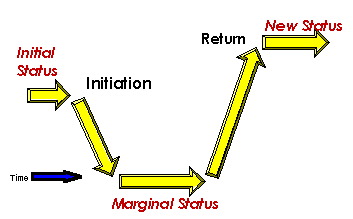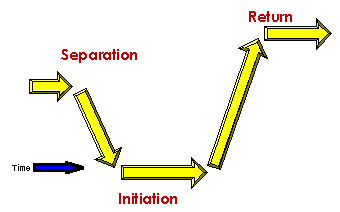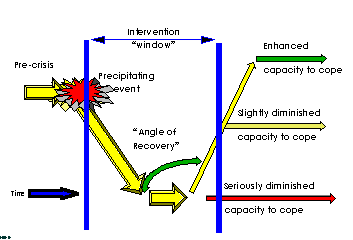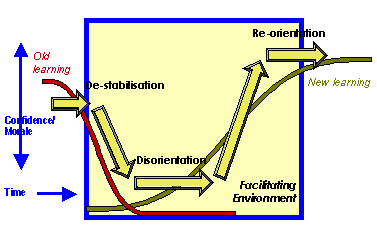Learning as Loss: 2

Fig 5: Rite of passage
Rites of Passage
One of the few universal patterns found in every society so far investigated is that of the "rite of passage" first described by van Gennep in 1909. Rites of passage occur when a person changes a fundamental status or basic role (Banton 1965), such as from child to adult, or from single to married. In all cases, the transition does not take place directly, but via a temporary, marginal or "liminal" intermediate status, through which the person must pass in order to reach the new role or status.
The Pattern of Myth

Fig 6: The quest myth
According to Joseph Campbell (1975), one basic "monomyth" (a fundamental pattern of myth found in all cultures) is that of the quest, which has the same basic form as the rite of passage (which is probably not surprising). The hero (sorry to be sexist, but it is almost invariably a male) has an encounter which removes him from the ordinary world into another realm, in which he has a series of adventures and ordeals, and from which he returns to the ordinary world endowed with special powers or with a gift for the community.
Conversion
In earlier studies, I also noted that the theological New Testament account of conversion could also be rendered in similar terms, involving an initial stage of conviction of sin and confession, an intermediate one of repentance, and a final new birth: this is however represented more as a logical sequence than a chronological one
Crisis
Fig 7: Crisis
(Click in figure for larger version)
According to Caplan (1964) and other crisis theorists, the pattern of psychological crisis (such as major loss, bereavement, redundancy, etc.) can be mapped in the same kind of way. The level of functioning of the person prior to the crisis is determined by a number of psychological and social factors: the crisis hits at the point at which the "stressor event" becomes a psychological reality (which cannot be anticipated), and precipitates a psychological decline as a result of the exhaustion of existing coping mechanisms - anything which does not exhaust such mechanisms is not really a crisis. This leads into a trough of demoralisation from which the person begins to emerge to attain a level of functioning which may be diminished, similar to what it was before, or enhanced. The point of emergence from the bottom of the trough is known as the "angle of recovery", and the more acute, the better.
According to crisis intervention theory, the individual is open to help during the window of opportunity created by the exhaustion and abandonment of coping mechanisms in a way which is not possible either before the onset of the stressor event or afterwards. The level of post-crisis functioning becomes fixed at the point where the post-crisis behaviour begins to have secondary consequences, and the window closes at this point. Caplan goes so far as to put a time on this window: he says it lasts from four to six weeks, but not all theorists would agree.
Three-stage models of the learning process
Various theorists have adopted a similar three-stage model to describe forms of learning, although the phenomenon of supplantive learning as such has received very little attention in the literature. Kurt Lewin (1945) was one of the few theorists to have taken seriously the difficulties of personal change, and he articulated the process in terms of unfreezing (getting out of old behaviour), change itself, and re-freezing (consolidating the new behaviour, although he did not identify a trough in between. Lifton's (1961) study of Communist Chinese "thought reform" or "brainwashing" has a similar three-stage model, of confrontation (emphasising the deliberate de-stabilisation of the "learner's" self-image), re-ordering, and renewal. Mezirow (1978) discusses the more benign phenomenon of "perspective transformation" through adult education, which he expresses through the three stages of alienation (from the old self), re-framing and contractual solidarity, which is socially expressed and analogous to Freire's conscientisation (1972, 1979)
In this country Hopson and Adams (1976) have used a similar trough model to describe personal change or "transition", although theirs, drawing on Imara (1975) has seven stages rather than three; and Thomas and Harri-Augstein (1985) also adopt a similar approach with the terminology of awareness of the old learning robot, the learning trough (the general use of the term in this paper derives from them) and new learning level.
My own preference is for stages of de-stabilisation, disorientation, and re-orientation, which differ in emphasis and detail from the sequences discussed above because of their particular focus on learning, and are described in more detail below. Like the models from other disciplines, however, I also choose to emphasise the frame of the learning, demarking a critical period in the process which others tend to ignore. The complete three-stage model attempts to describe successful problematic supplantive learning: it may well fail at any point.
Fig 8: Problematic
Supplantive Learning
(Click in figure for larger version)
Occasions of learning
Indeed, in the light of the preceding arguments, it may seem surprising that anyone would actually go through with problematic supplantive learning, and yet they do. The occasions (in the sense of "circumstances which occasion") of such learning require some discussion at this point, because they make some difference to the way in which the sequence is experienced. There are basically three kinds of occasion or stimulus: the first two are powerful and clearly non-educational, the third is potentially educative but very much weaker:
- Crisis: this has been discussed above, and occurs when the learner has no alternative but to change, because external circumstances have changed. The fitness landscape has changed around him, as it were, and he is no longer in an aporia or any other kind of niche. In this case the de-stabilisation and disorientation stages are the product of the crisis, and only the re-orientation is strictly part of the learning process.
- Hitting bottom: this term is used by Alcoholics Anonymous to describe the bottom of the trough, where the de-stabilisation is synonymous with the most acute disorientation, because there is nowhere further to fall, and the only way is up. In this case, too, the learning process focuses principally on re-orientation.
- The Facilitating Environment: the term is borrowed from Winnicott (1965), who uses it to describe the conditions under which growth and learning can potentially take place, although his concern is with early childhood learning. In this context it is most clearly experienced as a safe situation in which the potential learner can experiment whilst preserved from the pressures of the rest of the world. It is also strong enough to act as a container for the feelings engendered during the learning process (Bion, 1970). While the first two circumstances compel change, this safe setting merely makes it possible. It will also be up to someone (a teacher or a mentor, perhaps) to hold out the hope that:
- the learning can be achieved,
- and that the pay-offs will be sufficient to justify it
< 1 2 3 Notes Case-study >
Atherton J S (2013) Doceo; [On-line: UK] retrieved from
Original
material by James Atherton: last up-dated overall 10 February 2013 
This work is licensed under a Creative Commons Attribution-Noncommercial-No Derivative Works 3.0 Unported License.
Search Doceo and associated sites:
![]() Save this on Delicious Tweet
Save this on Delicious Tweet
 Click
here to send to a friend
Click
here to send to a friend
This site is independent and self-funded. The site does not accept advertising or sponsorship (apart from what I am lumbered with on the reports from the site Search facility above), and invitations/proposals/demands will be ignored, as will SEO spam. I am not responsible for the content of any external links; any endorsement is on the basis only of my quixotic judgement. Suggestions for new pages and corrections of errors or reasonable disagreements are of course always welcome.


